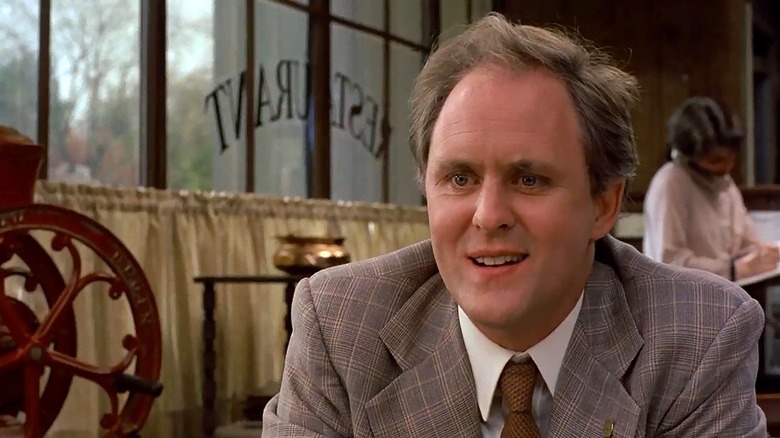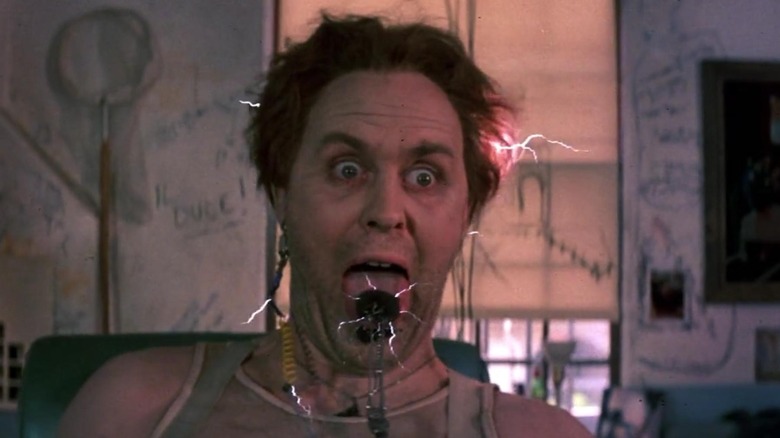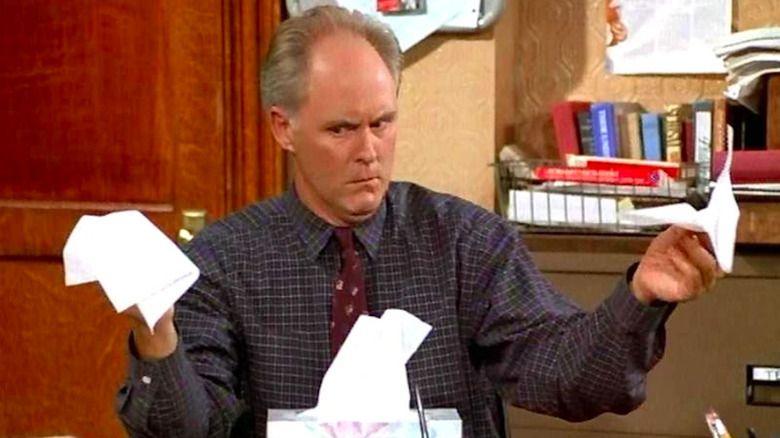Cheers Tapped John Lithgow To Play Frasier But He Declined Instantly
When "Cheers" returned to NBC's airwaves for its third season, viewers were desperate to see how bartender Sam Malone (Ted Danson) and Diane Chambers (Shelley Long) had handled their breakup at the conclusion of the previous season's finale. Had they moved on or possibly reconciled?
The answer was a little more complicated than perhaps many fans expected.
Recovering alcoholic Sam was back on the sauce and carousing with self-destructive abandon. Diane was, as ever, Diane, but she couldn't bear to see Sam in such a rough way. She didn't want to get back together with him, certainly not while he was scraping rock bottom, but she still cared about her ex. She needed to see him in at least a semi-functional state. She needed to get him help. And she believed she knew just the man who could throw him a lifeline.
That man, of course, was psychiatrist Frasier Crane. Well-educated, witty and urbane, Frasier embodied just about everything we believed Diane truly wanted in a man. He might've been utterly devoid of Sam's swaggering sex appeal, but Diane was good on swagger for the time being. Frasier offered stability. Or so we thought.
We'd soon discover Frasier was every bit as screwed up as the rest of the gang at Cheers, but the character had to work as a romantic rival for Sam (especially since Sam initially had no idea he was dating Diane). And the actor who played him had to be able to physically hold his own in a scene with the 6'2" Danson. He couldn't present as a pushover.
At 6'1", Kelsey Grammer wound up being a perfectly tweedy complement to Danson's loosey-goosey casanova. But if the "Cheers" team landed their first choice, they would've had a literally big dilemma on their hands.
A physically intimidating Frasier Crane?
According to Warren Littlefield's memoir "Top of the Rock: Inside the Rise and Fall of Must-See TV," the producers of "Cheers" were keen to cast John Lithgow as the endearingly highbrow Frasier. This is one heck of a "what if," one that, if it had come to pass, might've derailed the show.
When the third season began in 1984, Lithgow was an in-demand character actor. Two years prior, he'd received an Oscar nomination for Best Supporting Actor as the transgender former football player Roberta Muldoon in George Roy Hill's "The World According to Garp." He'd followed that up with critically acclaimed performances in James L. Brooks' "Terms of Endearment" and George Miller's white-knuckler segment of "Twilight Zone: The Movie."
He was also 6'4" and looked every inch of it on screen.
Though Lithgow was remarkably adept at making himself feel emotionally small, if not wholly pathetic, on camera (particularly in "Twilight Zone: The Movie"), he needed directors who knew how to shoot and cut around his size. In a multi-camera sitcom, he'd physically dominate as the stiff, ramrod straight Frasier in full shots with Danson's Sam. While I'm sure an actor as gifted as Lithgow would've found a way to play smaller than he is within this visual framework, the point wound up being moot because he didn't want the part.
It was like swatting away a fly
As Lithgow said in Littlefield's memoir:
"I just said, 'No.' ... I barely even remembered that request. It was like swatting away a fly. ... I just wasn't going to do a series."
How did that work out for Lithgow? He had a phenomenal 1984. He was surprisingly sympathetic as the proscriptive Reverend Shaw Moore in Herbert Ross' "Footloose," gloriously off his rocker as Dr. Emilio Lizardo in W.D. Richter's cult masterpiece "The Adventures of Buckaroo Banzai Across the 8th Dimension," and refreshingly down to earth as spaceship designer Dr. Walter Curnow in Peter Hyams' "2010: The Year We Make Contact."
Although the quality of his film work fell off for a while after that (the less said about 1985's hideous "Santa Claus: The Movie," the better), he would subsequently wow Broadway critics with his performances in Rod Serling's "Requiem for a Heavyweight" and David Henry Hwang's "M. Butterfly." And he'd finally get over his aversion to sitcoms in 1996, when he took the lead role of alien patriarch Dick Solomon in NBC's long-running "3rd Rock from the Sun" (using his considerable size to brilliant physical-comedy effect).
Most importantly, Lithgow had no series television commitments in 1992, which allowed him to give a bravura five-in-one performance as the protagonist/antagonist of Brian De Palma's masterful "Raising Cain." And that is all that truly matters.


